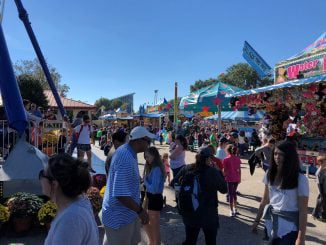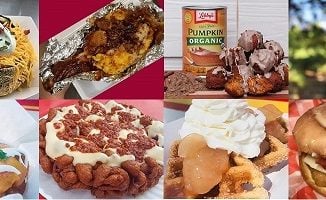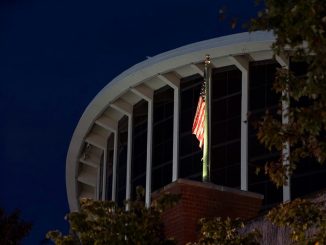
RALEIGH — The North Carolina State Fair is back in full swing this year after the 2020 version was canceled due to the Coronavirus pandemic. Agriculture Commissioner Steve Troxler, whose agency oversees the annual 11-day event, said this past February that it was “unbearable” not to have a fair last year, but that 2021 would be the best, and hopefully the biggest turnout, the state has ever seen. The fair, first held in 1853, typically draws around one million visitors a year. A successful state fair will also be a crucial element in helping the fairgrounds get back on solid ground financially. The venue reportedly lost $9.2 million in revenue last year due to COVID-19.
After last year’s hiatus, attendees longing for their annual deep fried greasy fair food fix will certainly have no shortages of options to choose from. The buffet of “I only eat this once a year” splurge items has also expanded. There are several new dishes debuting this year such as the Carolina Cowboy Roll from Fatboys BBQ, the Shrimp Alfredo stuffed turkey leg by Hickory Tree Turkey BBQ, and the Shrimp Mac and Cheese Eggroll from Waypoint Oyster Bar, just to whet your appetite.
Despite all these new food offerings, traditionalists fear not, as this year’s fair will also include many longtime favorites such as corn dogs, deep fried Oreos and of course those delicious frozen bananas. Local small businesses owner Rob Privette, takes a hiatus from his normal job each year to help his wife’s family run one of these frozen banana dessert booths each October. Excerpts from an interview are below:
NSJ: What is it like being a vendor this year?
Privette: “Every year at the fair is fun, stressful, and exhausting. I am sure this year will be the same. We have set up our stands as we always do and are excited to see what happens. The Covid pandemic has created uncertainties that were not there before.”
NSJ: Are there limitations?
Privette: “We have had a harder time this year finding some of the items we need. Prices have gone up on almost everything we use. Also, employees are harder to find.”
NSJ: Is it different than years past?
Privette: “It’s certainly different this year after having the fair cancelled last year for the first time ever. We’re uncertain what to expect moving forward into the ‘new normal.’”
NSJ: How are the crowds/sales expected to be?
Privette: “There are two possibilities:1, Will crowds be smaller because of fear of the virus? Or 2, will the crowd be larger than usual due to pent-up demand from skipping a year? We are expecting the latter: big crowds that are “chomping at the bit” to get back to the State Fair experience after having to spend a year without it.”
NSJ: What do you sell?
Privette: “We are in the frozen dessert business. We sell ice cream cones, frozen bananas, and frozen cheesecake. We also sell beverages such as sodas, coffee, hot chocolate, and bottled water.”
NSJ: How did your family get into this business?
Privette: “My wife’s great uncle started the business and traveled the U.S. doing fairs and festivals. He had ice cream stands at the very first State Fair. When he passed away it was handed down to my wife’s great aunt and when she passed away she left it to my wife, her brother and their mother.”
NSJ: What is your profit each year?
Privette: “Profits vary from year to year but if you have good products and present them well with clean, well-lit stands and friendly and courteous employees, you should expect 5-figure profits, anywhere from $10,000 to $30,000 dollars depending on the fair or festival’s duration.”
Livestock supporters honored
In other fair news this week, Agriculture Commissioner Steve Troxler inducted four new members into the N.C. State Fair Livestock Hall of Fame on Monday.
“This is one of my favorite events each year, because it gives me the opportunity to recognize the men and women who have helped to make our livestock shows some of the best in the nation,” Troxler said. “Today’s inductees join a select group that has been honored for outstanding support of agriculture and livestock at the N.C. State Fair.”
Following is the list of this year’s inductees:
Phil Fishel was inducted into the Beef Cattle category. He founded Windmill Acres Farm in Winston-Salem in 1972, and cattle bred there have won several awards at State Fair livestock shows over the years. Phil is well known for helping young people get started in showing polled Herefords, and has also run a tractor show at his farm for over a decade to help share agriculture with his community.
Gregory Langley was inducted into the Dairy Cattle category. Born and raised on his family’s farm in Staley, Greg was a well-known 4-H leader in his community. Greg served on the North Carolina Holstein Board for many years, and spent 15 years on the board of the Purebred Dairy Cattle Association. He was a proud showman at the State Fair, and loved to share his “college knowledge” with the youth. Despite his passing in 2015, Greg’s love of the fair and of showing livestock is carried on by his wife, Stephanie, and his children, Andie and Neil.
Dora Owens was inducted into the Sheep and Goats category. Dora has served as the secretary for the State Fair dairy goat show for 26 years, and has become one of the most relied-upon people at that show for participants and staff alike. Dora is the daughter of Ruth Weaver, also a Hall of Fame member, who she showed goats with at the fair when she was 12 years old. Dora is integral to the success of the dairy goat show. Since she started, the show has grown from aro und 300 entries to over 1,000.
Peter Daniel was inducted into the Commissioner Meritorious category. A leader in North Carolina agriculture for nearly 40 years, Peter began his career with the North Carolina Department of Agriculture and Consumer Services in the late 1970’s. He quickly advanced to become special assistant to then-commissioner Jim Graham, a position he held for 20 years. He became a respected leader in the state, and later took a job with the N.C. Farm Bureau as national legislative director and then as assistant to then-president Larry Wooten. Peter has had a hand in shaping much of North Carolina’s agricultural policy over the last four decades.



